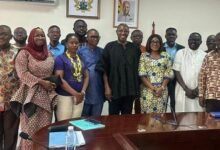MMDAs urged to scale-up fight against plastic pollution
Dr Eric Oduro Osae, a Public Financial Management and Local Government Expert, has urged Metropolitan, Municipal and District Assemblies (MMDAs) to scale-up fight against plastic pollution in the country.
He said MMDAs had a crucial role to play in ensuring that the plastic waste menace was reduced to the barest minimum or eliminated.
He said inefficient plastic waste collection and management often led to pollution of land, water bodies and drains, which frequently resulted in the flooding of cities during rains and loss of human lives and property.
Speaking to the Ghana News Agency in Accra, Dr Osae said plastic waste management was a challenge, however, the country must prioritise it by converting plastic waste into reusable things.
He said the issue of plastic waste was critical across the global, especially in third world and developing countries and sub-Saharan Africa.
“To deal with it as a country, what we need is a National Plastic Waste Management Policy and then within the Policy, we should have a National Plastic Waste Fund that will help us manage the situation,” he said.
Dr Osae said countries such as Rwanda, were working towards the elimination of plastics or promoting the use of easily convertible plastics, adding that this was to ensure that plastic waste would not be a challenge for them.
He appealed to the Government to work hand-in-hand with plastic product manufacturers/importers towards the development of the National Plastic Waste Management Policy.
“Let’s have a Plastic Waste Management Fund, and this fund should be distributed in accordance with the formula like the District Assemblies Common Fund (DACF),” he said.
He said part of the Plastic Waste Management Fund should be allocated to the MMDAs to support their plastic waste management activities.
He said MMDAs’ bye-laws should be implemented in such a way that the Polluter Pays Principle would be localised so that people who polluted the environment were taken on under those legislations and properly fined, stating that those fines should go into management of plastic waste.
Dr Osae, who is also the Director of the Internal Audit Agency of Ghana, said the DACF should also have a portion that could support the MMDAs in dealing with plastic waste.
“As a country we should work towards banning the use of plastic products in the medium to long-term and replace it with easily convertible and manageable materials.”
On the Polluter Pay Tax introduced by the Government, Dr Osae said it was a tax to manage pollution, however, plastic waste pollution was one aspect of pollution.
He advised the Government to properly define the areas in which the Polluter Pay Tax would be applied.
He said even if a portion of the Polluter Pay Tax was to be allocated to plastic pollution, which might not be enough; adding that “we need to complement it with other resources, especially at the local government level”.
This, he said, was why the MMDAs should be empowered to fine people who polluted the environment using plastic waste, declaring that there was the need for Ghana to have a sustainable way of funding plastic waste issues.
With regards to choked drains in many cities and towns, Dr Osae appealed to all MMDAs to start desilting their drains before the rainy season.
Dr Osae, who urged them to up their games in addressing the nagging issues of sanitation, also urged them not to wait for the third Saturday of every month to undertake cleaning and that it should be done every weekend.
He appealed to the Ministry of Local Government, Decentralisation and Rural Development (MLGD&RD) and the Ministry of Sanitation and Water Resources, to issue a joint communique directing all MMDAs to start desilting gutters and waterways within cities and towns to avert flood related disasters. GNA







